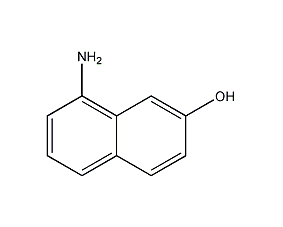
Structural formula
| Business number | 039S |
|---|---|
| Molecular formula | C10H9NO |
| Molecular weight | 159.18 |
| label |
aromatic compounds |
Numbering system
CAS number:118-46-7
MDL number:MFCD00004031
EINECS number:204-252-4
RTECS number:QL3331000
BRN number:None
PubChem number:24878181
Physical property data
1. Properties: needle-like crystals.
2. Density (g/mL, 25/4℃): Undetermined
3. Relative vapor density (g/mL, air=1): Undetermined
4. Melting point (ºC): 205-207
5. Boiling point (ºC, normal pressure): Undetermined
6. Boiling point (ºC, 5.2kPa): Undetermined
7. Refractive index: Undetermined
8. Flash point (ºC): Undetermined
9. Specific rotation (º): Undetermined Determined
10. Autoignition point or ignition temperature (ºC): Not determined
11. Vapor pressure (kPa, 25ºC): Not determined
12. Saturated vapor pressure (kPa, 60ºC): Undetermined
13. Heat of combustion (KJ/mol): Undetermined
14. Critical temperature (ºC): Undetermined
15. Critical pressure (KPa): Undetermined
16. Log value of oil-water (octanol/water) partition coefficient: Undetermined
17. Explosion upper limit ( %, V/V): Undetermined
18. Lower explosion limit (%, V/V): Undetermined
19. Solubility: Soluble in hot water and ethanol, soluble in It fluoresces blue in acid and alkali. It turns green-blue when encountering ferric chloride.
Toxicological data
1. Acute toxicity: mouse intravenous LD50: 180mg/kg
Ecological data
Slightly harmful to water.
Molecular structure data
1. Molar refractive index: 50.21
2. Molar volume (cm3/mol): 124.2
3. Isotonic specific volume (90.2K): 351.9
4. Surface tension (dyne/cm): 64.3
5. Polarizability (10-24cm3): 19.90
Compute chemical data
1. Reference value for hydrophobic parameter calculation (XlogP): None
2. Number of hydrogen bond donors: 2
3. Number of hydrogen bond acceptors: 2
4. Number of rotatable chemical bonds: 0
5. Tautomers.Mass: 10
6. Topological molecule polar surface area 46.2
7. Number of heavy atoms: 12
8. Surface charge: 0
9. Complexity: 160
10. Number of isotope atoms: 0
11. Determine the number of atomic stereocenters: 0
12. No Determine the number of atomic stereocenters: 0
13. Determine the number of chemical bond stereocenters: 0
14. Uncertain number of chemical bond stereocenters: 0
15. Number of covalent bond units: 1
Properties and stability
Stable at room temperature and pressure, avoid contact with strong oxidants.
Storage method
Stored in a cool, ventilated warehouse. Keep away from fire. should be kept away from oxidizer, do not store together. Equipped with the appropriate variety and quantity of fire equipment. Suitable materials should be available in the storage area to contain spills.
Synthesis method
It is obtained by alkali fusion and acidification of 1,7-aminonaphthalene sulfonic acid (1,7-Clif acid).
Purpose
Organic Synthesis. Dye intermediates. After acetylation, 1-acetamido-7-naphthol can be obtained, which is used to make azo dyes.

 微信扫一扫打赏
微信扫一扫打赏

